It doesn’t matter whether they’re cold or warm blooded, scaly or furry, a beloved pet refusing to eat constitutes a worrying time for all pet owners.
When an animal isn’t eating, it is natural to envision the worst case scenarios as to what could be the underlying cause.
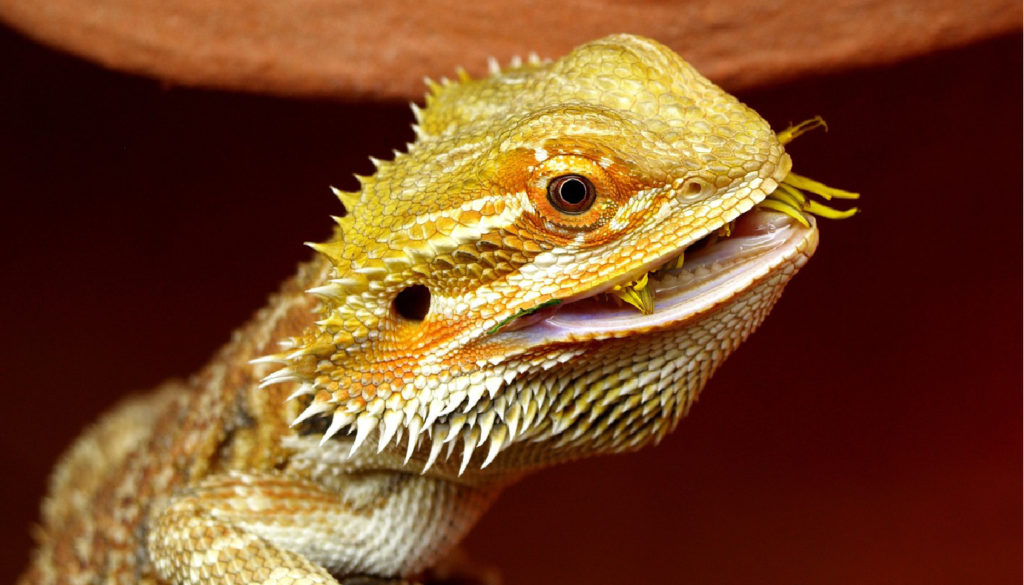
Oftentimes, however, the reason behind a pet’s sudden lack of appetite can be simple, and often will clear up on its own given a little time.
However, sometimes there can be simple little measures you can take to help encourage your pet to resume eating, or more natural reasons indicative to their specific breed that explain why food has become disinteresting.
Bearded dragons are known to be quite expressive and enigmatic pets, with their own quirks and personalities, and with such a spirited breed, a disinterest in food can often be a signal of a wide range of factors, which can sometimes leave their owners guessing.
In this article we’ll be exploring and troubleshooting some of the reasons as to why you beloved bearded dragon is not eating.
Quick Navigation
A Bearded Dragon Background
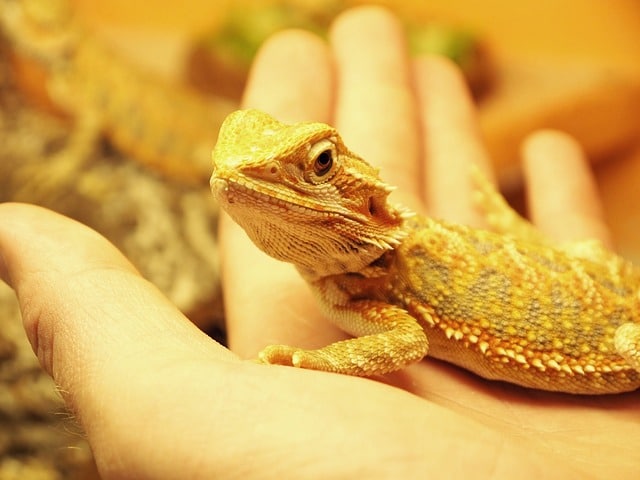
While this section of the article may not be as useful to seasoned bearded dragon owners, for those with a new addition or looking to add a bearded dragon to their home, a little background is helpful.
Officially named Pogonas, or Pogona Vitticeps in Latin, the bearded dragon is a species of lizard commonly kept as a household pet.
With a lifespan of around 10-15 years, a bearded dragon can also grow to around 45cm (around 18 inches) in length.
Originally indigenous to Australia, bearded dragons can now be found in homes all over the world.
As with all members of the lizard family, and unlike more common pets such as dogs or cats, bearded dragons are cold-blooded, meaning their body temperature is reflective of the environment they are in.
Put simply, if your bearded dragon is in a cold room, it will be cold, and vice versa.
Bearded dragons most typically have the best temperament of all pet lizards, and with the correct supervision, can make great companions for children.
They are typically quite docile, and often will enjoy interactions and handling. Like humans, they are also diurnal, meaning they are awake during the day, and will sleep during the night.
Bearded dragons also love to eat, which is why, as this article aims to explore, when a bearded dragon’s appetite becomes reduced, can become worrying for many owners.
Dietary Requirements of the Bearded Dragon
Like humans, bearded dragons are omnivores, this means they eat both living creatures (carnivores) and vegetable and plant matter (herbivores).
Of course, as with feeding any pet, the ratio of meat to vegetation should be as closely reflective of their natural diet in the wild as possible.
Therefore, the typical average ratio in regards to a bearded dragon usually sits at around 75% meat and 25% vegetables for juveniles, and 25% meat / 75% vegetables for adults.
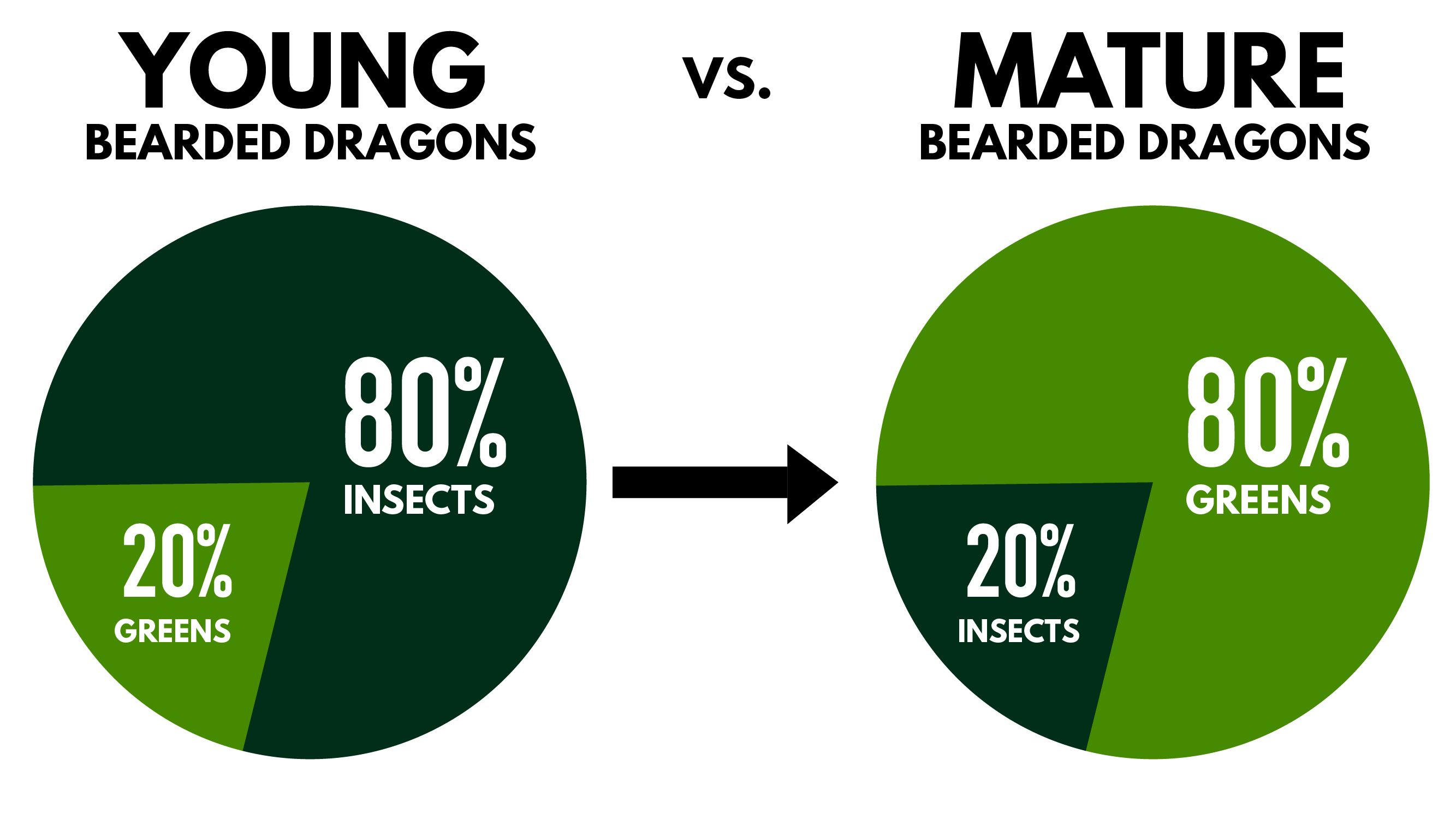
The most common meat/animal products that bearded dragons enjoy consuming include live insects such as:
- Dubai Roaches
- Mealworms
- Superworms
- Crickets
The types of plant matter they particularly enjoy include greens such as:
- Mustard Greens
- Collard Greens
- Dandelion Greens
- Turnip Greens
- Escarole (Chicory Greens
- Endive
- Coriander (occasionally)
Any food that isn’t live should be cut into bite-sized pieces prior to being placed in your dragons tank.
Regularly supplementing your bearded dragon’s diet with vitamins such as Repti Calcium and Repashy supplements is also recommended.
Foods that are dangerous and/or highly toxic to bearded dragons include spinach, beets, avocado, rhubarb, and any kind of glowing insect, such as fireflies.
It is also worth noting that all insects fed to your dragon should have been specifically bred and brought from a reputable speciality pet store.
Wild bugs and insects can contain all manner of harmful parasites or bacteria, which could have your Beardie feeling more than just a little under the weather!
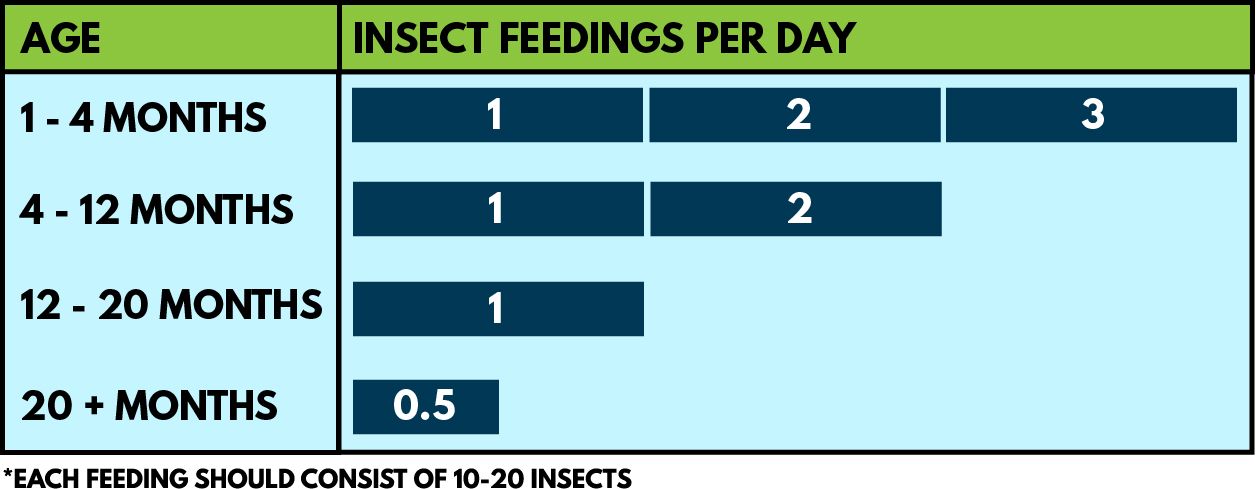
As shown above, this ratio may need to be tweaked in regards to your specific dragon, and should definitely be revised as they reach their older years, increasing the level of vegetation to reduce the risk of obesity. We weren’t lying when we said that beardies love their food!
Check out our Complete Bearded Dragon Diet Guide if you would like a more in-depth explanation about how to feed your Bearded Dragon a healthy diet.
Is Your Bearded Dragon Not Eating? Here Are Some Possible Reasons Why
There are many reasons why your bearded dragon won’t eat, many of them very minor and certainly not life threatening.
Please be aware, however, that this does not represent an exhaustive list, and, if ever you are in serious doubt, it is always best to err on the side of caution and seek the aid of a veterinarian.
1. A Grumpy Dragon
Bearded dragons are very expressive and enigmatic lizards, and will often communicate their negative emotions through a disinterest in food or even a bit of aggression.
Small changes can sometimes be enough to cause this, such as changes in diet, temperature, or lighting. Larger changes such as a new tank or a relocation can also cause a lack of appetite in your dragon.
Luckily, this response will usually settle in time. However, if your dragon continues to fast, then it may be that a recent change you made really isn’t settling well with them, and you may need to revert back to your previous system.
An example of this would be changing the regularity of specific vegetables, or increasing the lighting in the space that your lizard is housed.
If your dragon lives in an environment with other beardies, then it may also be advisable to keep your eye on the tank, as one dragon may be more dominant, and bully the other, causing undue stress, and appetite suppression.
If this is the case, then it is best to house your dragons in separate environments.
2. Improper Lighting
As mentioned in the previous point, lighting can really affect a lizard’s appetite.
Imagine how hungry you’d be if you were expected to try to eat in the dark, or, on the flipside, with a spotlight directly on you.
As they are cold-blooded and diurnal, cold temperatures and a darker environment will typically signal sleep or rest, where as a lighter and warmer environment will more closely represent a sunny day in your dragon’s natural homeland of Australia.
Because of their cold-blooded nature, many dragons won’t eat until they are warm enough, and post meal their lights should be kept on for around 2 hours, to ensure successful digestion.
A lack of correct lighting can also cause feeding issues. Bearded dragons need both UVA and UVB lighting for around 10-12 hours everyday.
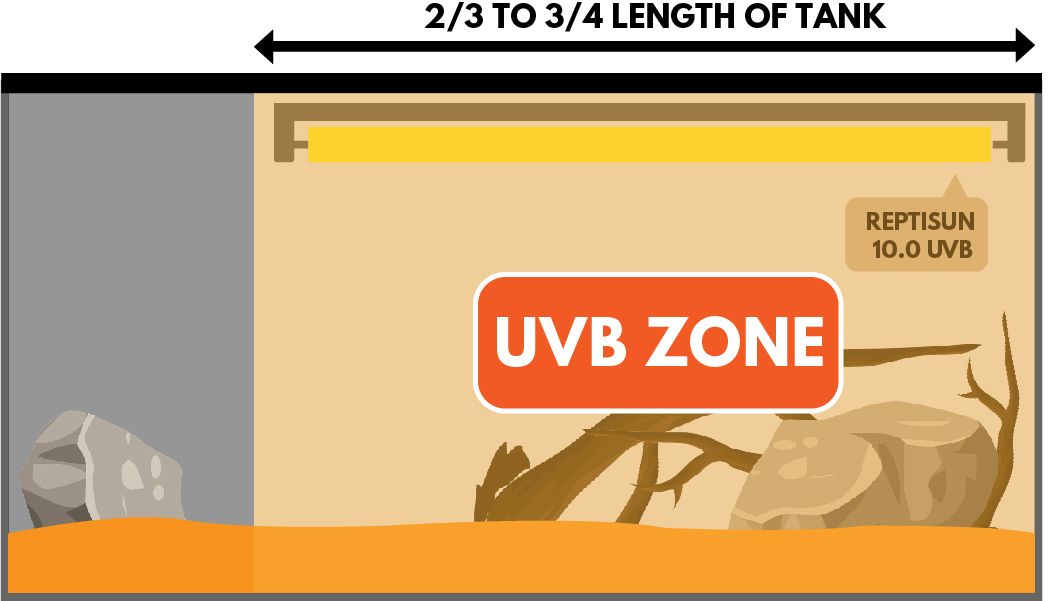
A lack of UVB light will not only suppress your Bearded Dragon’s appetite, but can actually cause life threatening health issues.
As a result, we always suggest that you take the time to set up a proper light system for your bearded dragon.
3. A Bit of Brumation
Like mammals such as bears who hibernate, lizards also have periods of the year where they will go into their own form of hibernation, which is called ‘brumation’.
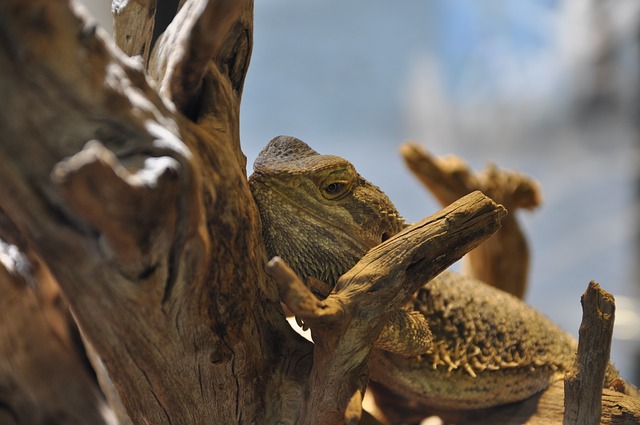
If you find your little beardie lurking in cooler places of their tank/enclosure, in a lengthy state of rest, then this is likely a time your dragon has chosen to brumate.
However, whilst they will be disinterested in food at this time, and very still, it is important to make sure they stay hydrated, and be mindful not to let the enclosure’s overall temperature drop too low.
4. Uncomfortable Impaction
Similar to the disinterest in food humans have when constipated, if your bearded dragon is suffering from impaction, then until things begin to clear, eating will be the last thing on their minds.
Impaction typically occurs when your dragon has an excess of something in their diets, such as too many live insects, or a poor ratio between meat and vegetation.
Your dragon also might be accidentally consuming the substrate in their enclosure.
If you feel this is likely the case, then for the sake of your dragon’s gut health, it’s best to switch to a different substrate option.
We generally recommend using a simple substrate such as shelf liner, newspaper, reptile carpet to avoid the risk of impaction.
5. An Itchy Dragon
Similar to how human babies struggle to sleep when they are teething, when your bearded dragon is shedding, the itchy discomfort can often make food become a far lower priority.
You’ll know if your bearded dragon is shedding if their scales appear dull or patchy, or if their tail is starting to grey at the tip.
Usually, once the shedding has passed, your dragon will return to its usual eating habits.
6. End of Growth Spurts
If your dragon is young, and you’ve owned it since infancy, you may notice as it reaches adulthood, your dragon will not eat as much as usual.
This is perfectly natural, as food is no longer required for growth, and is now only needed for sustenance.
7. Parasites
As a large amount of your lizards sustenance comes from insects, if they are incorrectly sourced, then they could infect your dragon with a parasite.
These can cause your dragon to feel under the weather, and disinclined to eat. This can also cause the reverse, resulting in your dragon gaining an increased appetite, as they try to sustain themselves whilst the parasite is taking the lion’s share of the food’s nutrients.
If you think this could be the root of your bearded dragon’s issues, then you’ll need to make a trip to the vet as soon as possible.
8. Infection (Mouth Rot)
While the name of this condition may seem terrifying for some owners, this condition can be relatively common to bearded dragons, and is caused by an infection in the mouth.
As this is quite painful, many afflicted dragons will not want to eat. Other clear signs of mouth rot include; swelling around the head, white or yellow oral cavity, loose teeth, increased saliva production, and bleeding.
Luckily, while these symptoms may seem quite extreme, mouth rot is highly treatable, and any veterinarian skilled in lizard or reptile care will be able to administer the correct treatment.
9. Illness
Of course, aside from injury, this factor constitutes the worst case scenario on this list.
If none of the other common causes seem to fit, then it may be likely that your bearded dragon is suffering from some kind of illness, and a trip to the vet will be required.
If this is the case, if possible, collect some of the lizard’s droppings, as examining them or sending them for testing can help give your vet a better idea as to what the underlying cause is for your dragon’s lack of appetite.
10. Injury
Bearded dragons are not immune to injuries such as broken bones, which can result from accidents, not being handled properly, or bullying/fighting from other lizards in the same enclosure.
If you find your dragon, particularly if still an infant as the bones are weaker, exhibits a suppressed appetite as well as an area of swelling on their body, then it might be best to schedule a check up with the vet, to ensure your dragon is uninjured.
Hungry Beardies
As this list clearly demonstrates, bearded dragons can be quite the pernickety personalities, and can often stop eating for short periods of time with little or no reason.
As long as this suppressed appetite does not become extended or occur too frequently, then it can simply be chalked up to typical beardie behaviour.
Many times, such as with a moody or stressed lizard, as well as with a shedding or bruminating dragon, whilst some monitoring is advised, the issue will simply clear up on its own.
However, if the issue doesn’t resolve itself and your dragon is showing signs of malnourishment, illness, or injury, then it is your duty as a caring owner to bring your dragon to qualified vet with either experience, or specialism in reptile care.
As with most problems in life, if something is caught early it is usually far more treatable, or far more commonly remedied.
Either way, we hoped this article will offer a handy troubleshooting guide as to why your beloved bearded dragon isn’t eating.
While we hope you never need to use or act upon any of the topics on this list, being clued up on some of the warning signs will help you be the best beardie owner possible!
My 6mth old bearded dragon just came out of brumnation. He started eating superworms but past few weeks hes only eating every few days in morning and no longer at night.
Am i doing something wrong?
Hi Patricia! Some beardies take a while to get back into their normal eating patterns. We actually just posted a long guide on brumation – you can find it here: https://www.reptileadvisor.com/bearded-dragon-brumation/
Please let us know if you have any other questions!
Jeff England thank you. He started in january so maybe he will be done this month. He is staying at top of tank basking in the sun coming from the window, but appetite isnt as aggressive. But he looks healthy and active when i play with him. Any suggestions on how to get him to eat veggies without me hand feeding sometimes pushed
Just bought my baby beardie from a pet store the first couple of days he ate fine about 30 crickets a day for the last 3 days he hasn’t eaten anything I’ve offered him more crickets and even some roaches and greens and nothing his tank temperature is at 100° on the warm side and 75 on the cool has hidaways on both sides idk what to do to get him to eat
My beardie is about 6 months recently he’s hanging out on the cold side of the tank more and dropped down to only eating in the morning. He usually ate in the morning and again at 5pm 2 hrs before bed. Should I be concerned?? I’m in AZ and it’s getting colder than usual could that be the reason?